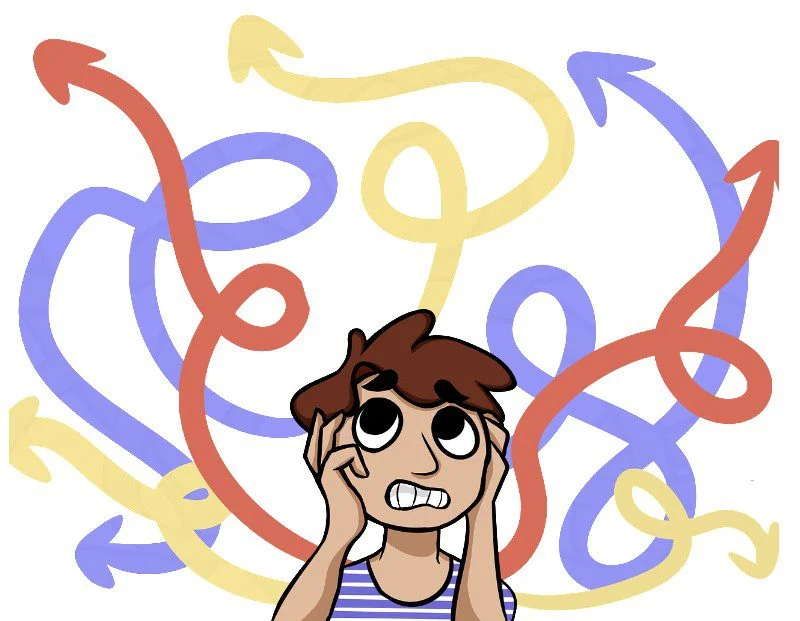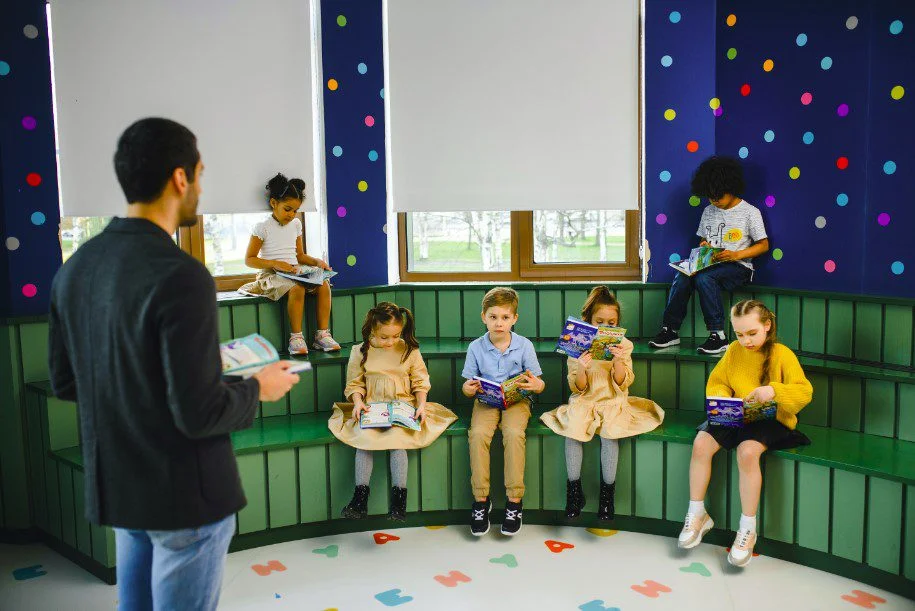Does your child get fidgety during homework time? Do they seem to bounce from one digital app to another without ever fully engaging? Does screen time make it harder to concentrate on other things? If so, your child is suffering from a short attention span.
If you too go through the same cycle of attention mishaps, then you too are a victim of attention deficit.
In today’s digital age, many children, and adults too, are constantly bombarded with loads of information from ubiquitous screens and other digital devices. This makes it increasingly difficult to focus on any one task at a time!
Question is, can we ever find a lasting solution to this nightmare?
The answer is double-edged with the onus resting very much in our hands. Yes, we probably have the power to counteract digital and other distractions and cultivate a love for focused learning and healthy living.
This is a tough task though!
But first, let us try to understand the underlying causes of poor attention in the 21st century. Only then can we figure out effective strategies to help ourselves.
What Causes Short Attention Span in Digital Children?

1. Digital Overload
Unlike adults, children are exposed to multiple digital devices such as smartphones, tablets, and computers from a very young age. This constant screen time in addition to analog activities can be overwhelming for their developing minds.
Their brains become overwhelmed with excessive data and information, making it difficult to concentrate on individual tasks. This is called digital overload.
The rapid pace of information and stimulation can make it harder for children to focus on tasks that require sustained attention.
A wealth of information creates a poverty of attention.
Herbert Simon 1977
2. Instant Gratification
The internet’s double-edged sword of flashy information and entertainment can definitely impact focus in children. It bombards us all with flashing lights, quick cuts, notifications, and multiple tabs vying for attention.
Just as well, the Internet provides instant gratification where a question gets answered instantly, and a funny TikTok video provides a quick laugh. This can make tasks that require sustained effort, like homework or assignments in the workplace, seem less appealing.
3. Lack of Physical Activity
Sedentary lifestyles, often associated with excessive screen time, contribute to reduced physical activity. Studies have shown a positive correlation between physical fitness and attention span in children. There’s even some evidence that exercise can be just as effective as low-dose stimulant medication for improving focus in children with ADHD.
Exercise helps promote the growth of brain cells and the connections between them. This improved brain function can lead to better focus, concentration, and overall cognitive function which includes attention span.
Likewise, physical activity is a great way for children to release pent-up energy and manage stress. When they are feeling restless or fidgety, it can be harder for them to focus on tasks requiring sustained attention.
Also true, physical wellness triggers the release of dopamine, a neurotransmitter that plays a crucial role in motivation, focus, and reward processing. Regular exercise can help regulate dopamine levels, leading to better sustained attention.
4. Poor Diet
Diets high in sugar and refined carbohydrates can cause blood sugar spikes and crashes, which lead to poor focus. Additionally, diets high in processed foods and additives are linked to hyperactivity and attention issues, especially in children.
Deficiencies, particularly in essential nutrients like omega-3 fatty acids, iron, zinc, and B vitamins, can impair cognitive function and attention.
5. Dehydration
Our brains are about 80% water, so it makes sense that hydration plays a crucial role in cognitive function, including attention span. Even mild dehydration can reduce concentration and mental performance.
When dehydrated, the body prioritizes sending fluids to vital organs, reducing blood flow to the brain. This can lead to sluggish thinking, dizziness, difficulty concentrating, and decreased alertness.
Also true, electrolytes like sodium and potassium are essential for proper nerve function, which is key for focus and concentration. Dehydration can disrupt this balance, leading to impaired cognitive function.
6. Poor Sleep
Inadequate or poor-quality sleep impairs cognitive functions, including the ability to concentrate and maintain attention. Lack of sleep can lead to slower processing speeds, reduced alertness, and increased distractibility.
Chronic sleep deprivation can exacerbate these issues, leading to more severe attention problems and decreased overall cognitive performance. Conversely, getting sufficient, high-quality sleep supports optimal brain function, helping to maintain focus and attention throughout the day.
Should You be Worried?

Potential downsides of a short attention span:
- Trouble learning: Children who struggle to focus might have difficulty following instructions, retaining information, or completing tasks in school.
- Frustration and social issues: Short attention spans can lead to frustration with activities that require focus, impacting a child’s enjoyment and potentially causing social difficulties.
- Developmental delays: In some cases, a short attention span can be a symptom of an underlying learning disorder or ADHD. Early identification and intervention are crucial.
However, short attention spans are normal in young children. Their brains are still developing the ability to focus and filter out distractions.
Here are some reassuring points:
- Attention span naturally increases with age. Most children will develop better focus over time.
- Many factors besides technology can affect attention span. These include fatigue, hunger, and the nature of the activity itself.
So, what can you do?
- Observe your child’s behavior. If their attention span seems significantly shorter than expected for their age, or if it’s causing problems at school or socially, talk to their pediatrician.
- Focus on creating a healthy balance. Technology can be a great tool, but it is important to encourage a variety of activities that build focus and attention skills.
Remember, every child develops at their own pace. There’s no need to panic if your child seems a little behind.
Strategies to Fight Short Attention Span

1. Establish a Structured Routine
Creating a structured daily routine can help children develop better time management skills and enhance their ability to focus. A consistent schedule provides a sense of security and predictability, which is essential for young minds.
- Set Specific Times for Activities: Allocate specific times for homework, play, and digital activities. Ensure that your child understands and adheres to this routine.
- Include Breaks: Incorporate short breaks between activities to prevent burnout and maintain high levels of concentration.
- Time for Sleep: By ensuring the brain is well-rested, sleep supports sustained attention and better overall cognitive performance throughout the day.
2. Limit Screen Time
Regulating screen time is crucial in preventing digital overload and promoting better attention spans.
- Set Boundaries: Establish clear rules regarding the duration and timing of screen use. For example, limit screen time to one hour on school days and two hours on weekends.
- Promote Screen-Free Zones: Designate certain areas in the house, such as the dining room and bedrooms, as screen-free zones to encourage family interactions and uninterrupted sleep.
- Quality Screen-time: When screen time is allowed, prioritize high-quality educational content or interactive games that encourage focus. Co-watch shows and discuss them to extend engagement.
3. Embrace Analog Activities
Physical activity plays a significant role in enhancing cognitive function and attention span. Encourage children to engage in regular physical exercise through sports, outdoor play, and family activities.
- Promote Creative Games: Encourage activities that build focus in the real world. This could be reading, playing board games, building with blocks, doing puzzles, or spending time outdoors.
- Daily Exercise: Ensure that your child gets at least one hour of physical activity every day. This could include activities such as cycling, swimming, or playing in the park.
- Family Involvement: Participate in physical activities as a family to set a positive example and promote a healthy lifestyle.
4. Create a Positive Learning & Living Environment
Creating a conducive learning environment at home can significantly improve a child’s ability to focus and learn.
- Minimize Distractions: Set up a quiet, organized study area free from distractions such as television and noisy siblings.
- Provide Necessary Tools: Equip the study area with all the necessary materials, such as stationery, books, and a comfortable chair, to facilitate focused learning.
- Good Quality Sleep: A sleep-friendly environment includes a comfortable mattress and pillows, a dark and quiet room, and a cool temperature. Minimizing exposure to screens and blue light before bedtime helps regulate sleep patterns, making it easier to fall asleep and stay asleep.
5. Implement Mindfulness and Relaxation Techniques
Teaching children mindfulness and relaxation techniques can help them manage stress and improve their attention span.
- Practice Mindfulness: Introduce mindfulness exercises such as deep breathing, meditation, and yoga. These practices can help your child to stay calm and focused.
- Relaxation Activities: Encourage activities like listening to music, drawing, or reading, which can help your child relax and reset the mind.
- Short Physical Stints: Integrate short bursts of physical activity throughout the day. This can help a child release energy and refocus their attention.
6. Engage in Interactive and Stimulating Activities
Interactive and stimulating activities can keep children engaged and enhance their cognitive abilities.
- Educational Games: Utilize educational games and apps that challenge the mind and promote critical thinking.
- Creative Hobbies: Encourage hobbies such as drawing, painting, building models, or playing musical instruments, which require sustained attention and creativity.
7. Break Down Tasks
When tackling bigger projects or homework assignments, break them down into smaller, more manageable chunks. This can help a child stay focused on completing each step and build a sense of accomplishment as they progress.
This strategy can be applied to anything from cleaning their room to finishing a long math worksheet.
For example, if the task is cleaning their room, it could involve picking up clothes, putting away toys, and dusting shelves. Now, instead of saying
“clean your room,”
you could say
“pick up all your dirty clothes and put them in the hamper.”
In addition, the size of the chunks will depend on your child’s age and development. Younger children will need smaller, more manageable steps, while older children can handle larger chunks.
8. Nutrition for Better Attention Span
A balanced diet is essential for cognitive development and maintaining a healthy attention span.
- Brain-Boosting Foods: Incorporate foods rich in omega-3 fatty acids, such as fish, flaxseeds, and walnuts, which are known to support brain health.
- Limit Sugar and Processed Foods: Reduce the intake of sugary snacks and processed foods, which can lead to energy spikes and crashes, affecting concentration levels.
- Hydration: Ensure that your child drinks plenty of water throughout the day to stay hydrated, as dehydration can impair cognitive function.
Maintaining a balanced diet rich in fruits, vegetables, whole grains, lean proteins, and healthy fats supports overall brain health and better attention.
9. Good Sleep for Better Attention
Sleep is essential for better attention and focus because it allows the brain to rest and rejuvenate.
- Sleep for Better Memory: During sleep, the brain processes and consolidates memories, which is crucial for learning and retaining information.
- Sleep and Cognition: Quality sleep enhances cognitive functions such as problem-solving, decision-making, and critical thinking, all of which are vital for maintaining attention and focus.
- Sleep for Mental Health: Adequate sleep helps regulate mood and reduce stress, preventing the mental fatigue that can lead to distractibility.
10. Try Out the Art of ‘Flow State’
Lastly, and according to select experts, one of the initial steps in achieving functional attention and focus is through what is known as ‘flow state‘. This is a mental state of complete immersion, i.e. being ‘in the zone‘.
People in a flow state experience energized focus, full involvement, and enjoyment in the process of the activity. They have a sense of clarity about what they need to do and how to do it.
When immersed in flow state, they lose track of time and surroundings!
Flow states can be experienced in a wide variety of activities, from work and hobbies to sports and games. They are associated with positive emotions such as happiness, satisfaction, and fulfillment.
Children too, especially younger ones, naturally experience flow states quite easily. They get so absorbed in playing, building, drawing, or pretending that they lose track of time and surroundings. This is because they’re intrinsically motivated and fully engaged in the activity itself.
Here is how to help children with attention difficulties experience flow more often:
- Focus on Play: Provide ample opportunities for open-ended play. This allows them to explore their interests and find activities that truly capture their attention
- Minimize Distractions: Create a play space free from clutter and excessive noise. This helps them stay focused on the activity at hand.
- Movement Breaks: Schedule short movement breaks for children who have difficulty staying still. This can help them refocus and return to their activity with renewed energy.
- Positive Reinforcement: Catch them “in the flow” and celebrate their focused engagement. This reinforces the positive feelings associated with concentration.
- Keep it Fun: The most important thing is to make the activity enjoyable. When a child has fun, they are more likely to become fully absorbed.
Collaborating With Educators

Working closely with teachers can provide valuable insights into your child’s attention span and academic performance.
- Regular Communication: Maintain open lines of communication with your child’s teachers to discuss their progress and any concerns regarding attention span.
- Educational Support: Seek additional support or resources from the school, such as tutoring or counselling, if necessary.





Leave a Reply